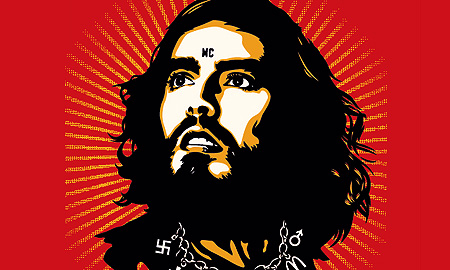Over the past week, the name of Russell Brand has been near inescapable. It seems no matter whether it’s via the medium of T.V., the internet or the radio, the eccentric comedian turned actor turned voice of the voiceless seems to be everywhere you look. And why shouldn’t he be? After all, it’s not every day such a well-known public figure advocates revolution in an interview with one of the most feared political commentators of our age.
Indeed, Russell Brand’s now famous interview with Jeremy Paxman certainly makes for fascinating viewing, and beyond that for a fascinating debate. In the 11 minute interview Brand raises some interesting points. One of the first issues raised in the interview is that of the right to vote, and Brand is instantly on the offensive. He doesn’t vote and never has, he says, and not out of lethargy, but out of “absolute indifference” with our political system. When Paxman questions him about what exactly is wrong with our political system, Brand seizes on his chance to speak out. Not only are those we elect “apathetic to our needs”, but the system that elects them “administrates for large corporations and ignores the population it was voted in to serve”. But these are not the only problems Brand has. His main gripe seems to be with the ““disenfranchised, disillusioned, despondent underclass” that is created by a system that caters to the rich and ignores the poor. Something needs to be done, he says, and not through the already established channels of voting but through revolution. This is something he actively advocates. Those that are available for election are much of a muchness, and the change they produce “is not dramatic enough, not radical enough”. We should abstain from voting, according to Brand, because voting changes nothing.
However, when Paxman quizzes Brand on what exactly he suggests as an alternative, he stalls, and it is here that the problem lies. What he does say is that the new system “shouldn’t destroy the planet, shouldn’t create massive economic disparity, shouldn’t ignore the needs of the people”. Hear hear!! He states that he thinks what the new system “won’t be like is a huge disparity between rich and poor”. Bravo. Such statements are all very idealistic, but what do they actually mean? Anyone could sit there and advocate a change to our political system. It is without question that there are huge problems with the way the system operates at the moment, and that the most worrying of these problems is the fact that there is such a gaping chasm between the richest and the poorest in society. I can see this. You can see this. Russell Brand can see this.
However, to suggest a revolution to bring about the changes that would address these problems is premature, and possibly dangerous. While the democracy we live in today certainly has its flaws, is it not the best of a bad bunch available? The very definition of a revolution is the forcible overthrow of a government or social order, in favour of a new system. The two key phrases here are ‘forcible’ and ‘new system’. If a revolution were to take place, it would not be a peaceful one, and are we as a nation ready for the possible anarchy that would result? Perhaps we would be if there were a viable alternative to what we have now, a figurative light at the end of the tunnel that we could fight and strive towards. But there is no such alternative. It could indeed be argued that ‘revolution’ is the hot topic in today’s world: The Arab Spring, which saw the overthrow of governments in states such as Egypt and Libya, is still fresh in the memory. But these revolutions produced huge internal turmoil and, what’s more, had democracy as an end goal to work towards. Even now these states still face huge difficulties as a result of their respective revolutions. What happens here once the existing system has been overthrown? Brand advocates “a socialist egalitarian system based on the massive redistribution of wealth” where “the very concept of profit should be hugely reduced”. This sounds for all intents and purposes like communism, which history has shown does not work. Just ask anyone who lived behind the iron curtain. The harsh truth is that it is within human nature to strive to succeed and work our way to the top, no matter what the ideals behind the original actions.
The purpose of this article, although it may be hard to see at first glance, is not to criticise Russell Brand for his outspoken views. It would not be fair, as Brand himself says in the interview with Paxman, to ask him to formulate a new world order that would address all of the shortcomings of our current system. If anything, Brand should be praised for using the public platform he has to draw attention to these shortcomings. Yet Brand oversteps the mark by calling for a revolution, not just because there is no better alternative available, but because of the obvious problems a revolution brings with it. Yes, a change is needed, and perhaps one day it will occur and a better, fairer system will come into effect. But until the day that that system can be determined, a revolution of the masses is simply not the answer. If you want to see a change, then put down your torches and pitchforks, for now at least, and get yourself down to the nearest polling station.

